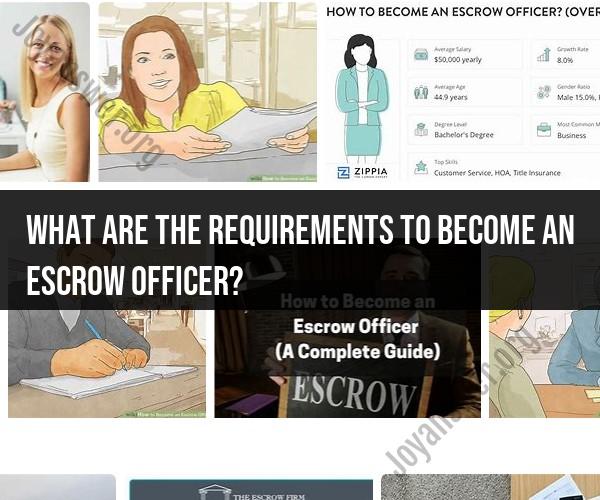What are the requirements to become an escrow officer?
Becoming an escrow officer typically involves meeting specific requirements, which may vary by location and employer. However, there are some common steps and qualifications to become an escrow officer:
Educational Requirements:
High School Diploma or Equivalent: You'll need a high school diploma or a GED as the minimum educational requirement to start a career as an escrow officer.
College Education (Optional): While not always required, having a degree in business, finance, or a related field can be beneficial and may make you a more competitive candidate.
Experience Requirements:
Work Experience: Most escrow officer positions require relevant work experience in the real estate or escrow industry. Entry-level roles such as escrow assistant or escrow processor are often the starting point.
On-the-Job Training: Gain practical experience through on-the-job training. This experience will help you understand the responsibilities and processes associated with escrow services.
Licensing and Certification:
Escrow Officer License (Varies by State): In some states, you may need a specific escrow officer license. Requirements and procedures for obtaining this license can vary, so check with your state's regulatory authority (usually a department of financial institutions) for details.
Certification (Optional): Consider earning a certification like the Certified Escrow Officer (CEO) designation offered by industry organizations like the American Escrow Association. Certification can enhance your professional credentials.
Other Skills and Qualities:
Detail-Oriented: Escrow officers deal with a significant amount of paperwork and financial transactions, so attention to detail is essential.
Customer Service Skills: Strong interpersonal and communication skills are important for working with real estate agents, buyers, sellers, and other stakeholders.
Math and Financial Skills: A solid understanding of financial transactions, including math and accounting principles, is crucial for managing escrow accounts.
Steps to Become an Escrow Officer:
Educational Preparation: Start by obtaining a high school diploma or GED. Consider enrolling in college courses related to finance, real estate, or business if you want to enhance your qualifications.
Gain Experience: Seek entry-level positions in the real estate or escrow industry. Positions like escrow assistant, escrow processor, or administrative roles within escrow companies can provide valuable experience.
On-the-Job Training: Learn about the escrow process, including handling funds, preparing documents, and coordinating transactions while working in an escrow office.
Licensing and Certification (if required): Check your state's specific requirements for escrow officer licensing. If necessary, complete the licensing process. You may also pursue optional certifications to stand out in the field.
Build a Network: Establish professional relationships with real estate agents, mortgage brokers, title companies, and other professionals in the real estate industry. Networking can help you access job opportunities and gain referrals.
Apply for Escrow Officer Positions: Look for job openings as an escrow officer at escrow companies, title companies, or real estate agencies. Tailor your resume to highlight your experience and qualifications.
Interview and Secure a Job: Prepare for interviews, demonstrate your knowledge of the escrow process, and emphasize your qualifications. Once hired, continue to expand your skills and stay updated on industry trends.
Remember that specific requirements can vary by location and employer, so it's important to research and understand the expectations in your area and industry. Additionally, joining relevant professional associations and attending industry conferences can help you stay connected and informed in the field of escrow services.
Becoming an Escrow Officer: Requirements and Steps to Success
Escrow officers play a vital role in real estate transactions by handling the financial and legal aspects of the closing process. They work with buyers, sellers, lenders, and other real estate professionals to ensure that all of the necessary paperwork is completed and that all of the funds are properly distributed.
Requirements
To become an escrow officer, you must typically meet the following requirements:
- Be at least 18 years old
- Have a high school diploma or GED
- Be a US citizen or permanent resident
- Have a clean criminal record
Steps to Success
Once you have met the basic requirements, you can take the following steps to become an escrow officer:
- Get an education. While there is no formal education requirement for escrow officers, many employers prefer to hire candidates who have an associate's or bachelor's degree in a related field, such as business, real estate, or finance.
- Get trained. There are a number of escrow officer training programs available, both online and in-person. These programs will teach you the basics of escrow and the closing process.
- Get licensed. Most states require escrow officers to be licensed. The specific requirements for licensure vary from state to state, but typically involve passing an exam and meeting certain experience requirements.
Educational, Training, and Licensing Requirements for Escrow Officers
The educational, training, and licensing requirements for escrow officers vary from state to state. However, there are some general guidelines that most states follow.
Education
While there is no formal education requirement for escrow officers, many employers prefer to hire candidates who have an associate's or bachelor's degree in a related field, such as business, real estate, or finance. Some colleges and universities also offer escrow officer certificate programs.
Training
There are a number of escrow officer training programs available, both online and in-person. These programs will teach you the basics of escrow and the closing process. Some training programs are offered by escrow associations, while others are offered by private companies.
Licensing
Most states require escrow officers to be licensed. The specific requirements for licensure vary from state to state, but typically involve passing an exam and meeting certain experience requirements. In some states, you may also need to complete a background check and fingerprinting.
The Role and Responsibilities of an Escrow Officer
The role and responsibilities of an escrow officer vary depending on the size and type of escrow company they work for. However, there are some common tasks that most escrow officers perform, including:
- Opening and managing escrow accounts
- Collecting and disbursing funds
- Preparing and reviewing closing documents
- Coordinating with buyers, sellers, lenders, and other real estate professionals
- Ensuring that all of the terms and conditions of the contract are met
Career Advancement and Continuing Education for Escrow Officers
There are a number of opportunities for career advancement for escrow officers. With experience, you may be able to move up to a management position or start your own escrow company. You may also be able to specialize in a particular area of escrow, such as commercial escrow or residential escrow.
To stay up-to-date on the latest industry trends and regulations, escrow officers are required to complete continuing education on a regular basis. The specific requirements for continuing education vary from state to state, but typically involve completing a certain number of hours of training each year.
Keys to Success in the Escrow Officer Profession
To be successful in the escrow officer profession, you must have strong organizational and communication skills. You must also be able to pay attention to detail and be able to work independently and as part of a team.
In addition, it is important to be ethical and honest. Escrow officers handle large sums of money and confidential information, so it is essential that they be trustworthy and reliable.
If you are interested in becoming an escrow officer, there are a number of resources available to help you get started. You can contact your local escrow association or research escrow training programs online.












